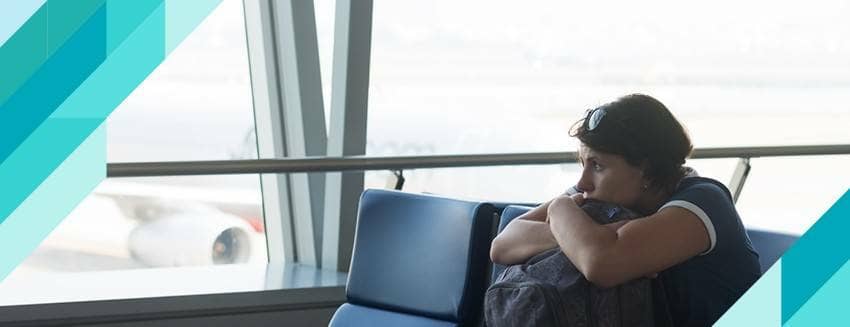
The plane crash at Sabiha Gökçen Airport has caused many people with fear of flying who were planning to travel by air to become anxious. Experts say that air travel is 266 times less risky than road travel, and that negative news about airplanes and movies based on accidents trigger fear to a significant extent.
Psychiatrist Assoc. Prof. Dr. Gökben Hızlı Sayar, Head of the Department of Clinical Psychology at Üsküdar University Faculty of Medicine, made evaluations about passenger psychology based on the plane crash at Istanbul Sabiha Gökçen Airport.
10 percent of passengers experience intense fear
Sayar started his speech by talking about the factors that trigger fear of flying and said: "Mark Twain has a famous quote: "Many people spend their lives suffering from tragedies that never happened. Although fear of flying is such a situation for many people, it is a proportional and rational protection attitude in the face of a real danger. In some cases, fear can serve a protective function by keeping the person away. But if the level of fear increases, the person panics and their reactions are inhibited. According to commercial airline statistics, 1 out of every 4 passengers (24 percent) who board an airplane show symptoms of fear of flying to a greater or lesser extent, while 10 percent show intense fear of flying. This fear affects the lives of many people and can prevent the use of airlines for transportation, leaving the person and sometimes the environment in a difficult situation. Most of the flight-related news in the media, such as airplane crashes, airplane malfunctions and hijackings, reinforce the fear of flying. In addition, many movies use plane crashes and hijackings as a theme of fear. On the other hand, we almost never come across articles and news reports about the safety and comfort of air travel. The fact that negative messages are so intense triggers and reinforces people's fear of flying."
266 times less risky than highway
Sayar stated that airline travel is less risky than other forms of travel and continued his words as follows: "The first step in overcoming fear of flying is to have knowledge about aviation. If an airplane is unsafe, it is banned from flying anywhere in the world. When it comes to safety in this sector, no expense is spared and every event related to the flight is checked many times. The commercial airplanes we fly on today all have redundant systems, meaning that if one system fails, another system is activated to take over its duty. This double security includes the flight crew. Considering that our cars are not inspected by many technicians before each trip, that we do not drive with a backup driver, and that many times more people die in road accidents each year than die in airplane accidents, airplanes are very reliable. To put it in numbers, the probability of an accident in road traffic is 266 times higher than in air travel, and the risk of death from smoking is 4,000 times higher than the risk of death from flying. While the number of people traveling by air in 1 year is 3 billion, the number of people who die in airplane accidents is less than the number of people who die from bee stings in 1 year."
Phobia is confused with cowardice
Pointing out that the concepts of fear and phobia are confused with each other in society, Assoc. Prof. Dr. Gökben Hızlı Sayar said, "Despite having all this information, if the person's fear is excessive, meaningless and continuous, if he/she experiences intense distress even when there is a possibility of encountering this situation, if this situation prevents the person's daily life and functions, then we call the fear "phobia". Similarly, if a person is extremely afraid of airplanes, cannot get on an airplane, either avoids or endures airplane travel with a lot of distress, then that person has an airplane phobia. Phobia is not a state of cowardice. Many people with airplane phobia are brave, agile and successful in their daily lives. However, flight phobia is a disease and can be treated. Frequent flights, learning and practicing relaxation and breathing exercises will help the person with fear of flying to overcome their fear."
It is possible to treat fear of flying in a short time
Sayar concluded his words by mentioning the treatments for fear of flying as follows: "In the treatment, it is first evaluated whether the person has other phobias, mental problems such as depression, stress-related disorders, substance abuse. Depending on the cause, severity and nature of the problem, drug treatments or psychotherapies can be applied. In psychotherapies, it is possible to overcome phobia by changing the patient's negative perceptions and misconceptions about flying, positive conditioning, systematic desensitization, teaching relaxation techniques and going above and beyond. With appropriate treatment, 70 to 90 percent success is achieved in a short time. Today, major airline companies offer short-term and highly effective fear of flying therapies."








